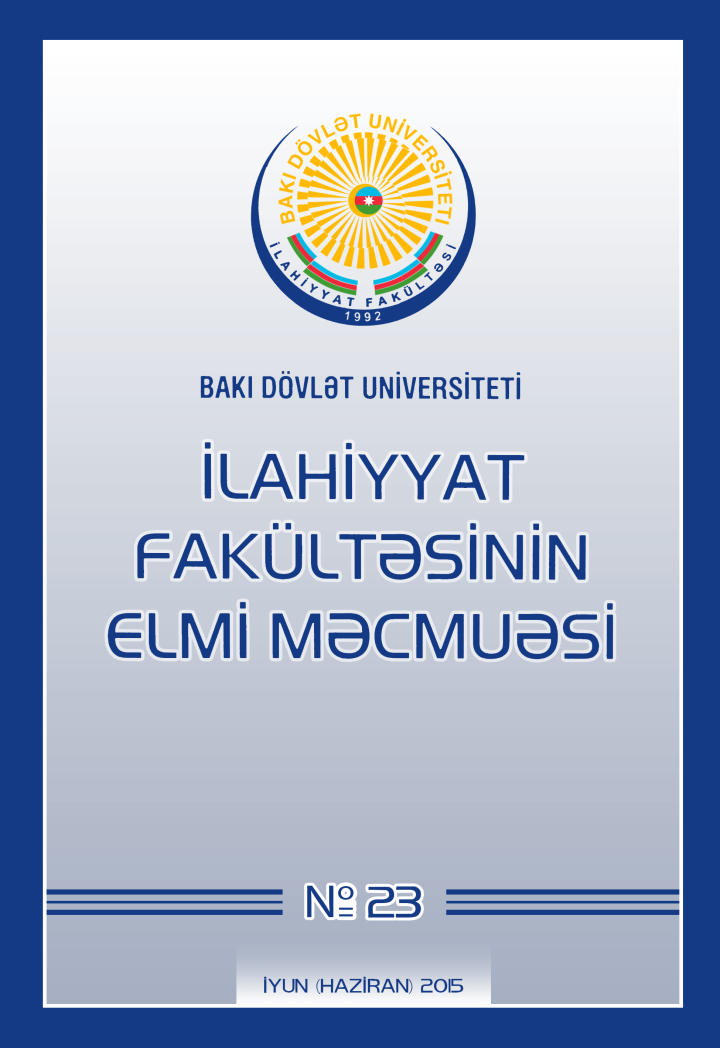Yəhudilikdə əhd məfhumu
The Concept of Covenant in Judaism
Понятие завета в иудаизме
Abegg, Martin G., “The covenant of the Qumran Sectarians”, The concept of the covenant in the Second Temple period, 81-97.
Adam, Baki, “Yahudilikte Din Kavramı ve Din Anlayışı”, Dinler Tarihi Araştırmaları, Ankara: Dinler Tarihi Derneği, 2000, s. II, 129-134.
Avery-Peck, Alan J., “Covenant”, The Encyclopaedia of Judaism (TEJ), [ed. J. Neusner, A. J. Avery-Peck, W. S. Green], I, 136-151.
Baltzer, Klaus, The covenant formulary in Old Testament, Jewish and early Christian writings, [trc. David E. Green], Oxford: Basil Blackwell, 1971, 99-122.
Cross, Frank Moore, Canaanite myth and Hebrew epic: essays in the history of the religion of Israel, 9. bsk., Harvard UP, 1997, 331-332.
Dumbrell, William J., Covenant and creation: a theology of the Old Testament Covenants, Carlisle: Paternoster Press, 2002.
Eichrodt, Walther, Theology of the OldTestament, [trc. John Baker], Philadelphia: The Westminster Press, 1961, c. I-II.
Elazar, Daniel J., Covenant and polity in Biblical Israel: Biblical foundations and Jewish expressions I: The Covenant Tradition in Politics, New Jersey: Transaction Publishers, 1995, I, 375.
Evans, Graig A., “Covenant in the Qumran literature”, The concept of the covenant in the Second Temple period, [S. E. Porter, J. C. R. de Roo], Leiden: Brill, 2003, 55-80.
Freedman, David Noel, “Divine commitment and human obligation: the covenant theme”, Interpretation, 18, (1964), 419-431.
Grabe, Petrus J., New covenant, new community: the significance of Biblical and Patristic covenant theology for contemporary understanding, Milton keynes: Paternoster Press, 2006.
Hahn, Scott, “Covenant in the Old and New Testaments: some current research (1994–2004)”, Currents in Biblical Research (CBR), III:2 (2005), 263-292.
Halevi, Judah, Kuzari: an argument for the faith ofIsrael, [trc. Hartwig Hirschfeld], 2. bsk., New York: Schocken Books, 1968, II:34.
Hillers, Delbert R., Covenant: the history of a Biblical idea, Baltimore: The Johns Hopkins UP, 1989.
Kirşenbaum, Aharon, “Ha-Berît ‘im Bney Noaḫ mul ha-berît ba-Sinay”, Dine Yisrael, c. 6 (1975), 31-48.
Licht, Jacob, “Dead Sea Sect”, Encyclopaedia Judaica, V, 506-508.
McCarthy, Dennis J., Old Testament Covenant: a survey of current opinions, Oxford: Basil Blackwell, 1973.
Mekhilta de rabbi Ishmael, [tr. Jacob Z. Lauterbach], Philadelphia: JPSA, 1976.
Midrash Rabbah, [ed. H. Friedman, Maurice Simon], London: Soncino Press, 1939.
Nitzan, Bilhah, “The concept of the covenant in Qumran literature”, Historical perspectives: from the Hasmoneans to Bar Kokhba in lights of the Dead Sea Scrolls, [D. Goodblatt, A. Pinnick, D. R. Schwartz], Leiden: Brill, 2001, 85-104.
Novak, David, The election of Israel: the idea of the chosen people, Cambridge: Cambridge UP, 1995.
Novak, David, The Jewish social contract: An essay in political theology, New Jersey: Princeton UP, 2005.
Sanders, Ed Parish, Paul and Palestinian Judaism: a comparision of patterns of religion, Philadelphia: Fortress Press, 1977.
Schiffman, Lawrence H., Qumran and Jerusalem: studies in the Dead Sea scrolls and the history of Judaism, Grand Rapids: Eerdmans Publishing, 2010.
Segal, Alan F., The other Judaisms of late antiquity, Atlanta: Scholars Press, 1987.
Sidur Kol Yaakov: The Complete Artscroll Siddur: Nusach Ashkenaz, Brooklyn: Mesorah Publications, 2000, 768 ve dvm.
Sifre to Numbers: an American translation and esplanation, [Jacob Neusner], Atlanta: Scholar Press, 1986, I-II.
Sifre: a Tannaitic commentary to the Book of Deuteronomy, [tr. Reuven Hammer], New Haven and London: Yale UP, 1986).
Stern, Sacha, Jewish identity in early rabbinicwritings, Leiden: Brill, 1994. TheBabylonianTalmud, [ed. Rabbi Epstein], London:The Soncino Press, 1978.
The Jerusalem Talmud: a translation and commentary, [Jacob Neusner], Hendrickson Publishers, 2008.
The Mishnah, [tr. Herbert Danby], Oxford UP, 1992.
The Tosefta, [ed. Jacob Neusner, Richard S. Sarason], New Jersey: Ktav Publishing House, 1986.
Vermes, Geza, The complete Dead Sea Scrolls inEnglish, London: Penguin Books, 1997.
Von Rad, Gerhard, Old Testament theology: the theology of Israel's historicaltraditions, Louisville: Westminster John Knox Press, 2001.
Weinfeld, Moshe, “Berit”, Theological Dictionary of the Old Testament, [ed.
Johannes Botterweck, Helmer Ringgren, Heinz-Joseph Fabry], II, 253-279.
Weinfeld, Moshe, “Covenant”, EncyclopaediaJudaica, V, 249-253.
Wilf, Steven, The law before the law, Lanham: Lexinton Books, 2008.
Endirin
Məqalə Məlumatları
- Məqalə Növü Articles
- Təqdim Edildi iyun 30, 2015
- Yayımlanıb iyun 30, 2015
- Nömrə № 23(23) İyun 2015
- Bölmə Articles
